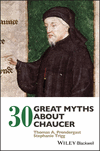CHAUCER WAS ANTI-SEMITIC
Summary
The anti-Semitism in the Canterbury Tales is the product of an attempt to create a particular literary effect, most likely the sentimentality and pathos of a small boy whose innocent devotion to the mother of God got him killed. The early twentieth century saw an increased focus on the character of the Prioress, often treating her anti-Semitism as distasteful, but not a true reflection of her character or, alternatively, as an expression of a generalized portrait of those who might have been hostile to Christianity. Chaucer's contemporaries may not have read the tale in ways that seem overtly anti-Semitic, but that does not mean that they were not complicit in a broader cultural anti-Semitism that had serious ethical consequences in the medieval period, just as it has had (and continues to have) serious consequences for late modernity.



